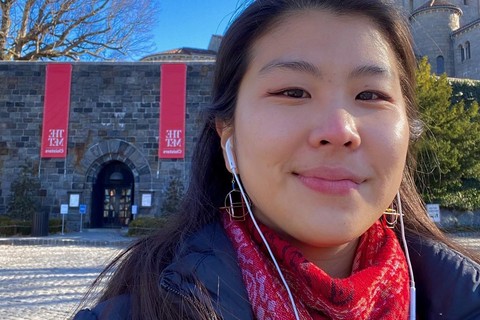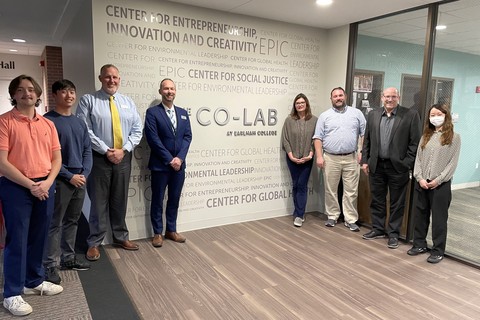Earlham College is a diverse and global community that includes students from 60+ countries. Our international students make up a critical piece of the Earlham puzzle, as they generally comprise about 20% of our student population.
As part of the Center for Global Education, our international student advisers work with our students throughout their time at Earlham College, beginning from the moment they confirm, until well beyond graduation in some cases. They serve as a source of advice, support, and information on matters of immigration regulations, cultural adaptation, and practical concerns.
Terra Dotta
One of the most important Earlham resources for an international student is the Terra Dotta platform. Here you will find information pertaining to visa, financial and academic issues as well as contact information for international student advisors.
Frequently Asked Questions
-
Can I work as an international college student in the U.S.?
Yes, international students are allowed to work in the United States with some restrictions. In the eyes of the U.S. government, students on an F-1 visa are permitted to work on-campus for up to 20 hours per week during the semester and up to 40 hours per week during breaks. However, Earlham usually limits those on work award to 10 hours per week. “On-campus employment must either be performed on the school’s premises, (including on-location commercial firms which provide services for students on campus, such as the school bookstore or cafeteria), or at an off-campus location which is educationally affiliated with the school. Employment with on-site commercial firms, such as a construction company building a school building, which do not provide direct student services is not deemed on-campus employment.” 8 CFR 214.2(f)(9)(i) (Code of Federal Regulations = CFR)
No prior authorization from the International Student Adviser is needed for these positions. Students will need to apply for a Social Security Number to be able to work on-campus, but must first have an offer of employment before they can apply for one. The Center for Global Education distributes standard letters to be completed by the employers for the students. International students should always meet with their International Adviser in CGE before accepting employment outside of Earlham College. For more information, check out /student-life/global-community/international-students/employment-regulations/
-
Can I work in the U.S. after graduation?
For students wishing to pursue employment related to their major(s) after graduation, Optional Practical Training, or OPT, can be an option. This requires consultation with your International Adviser, preferably at least 90 days before your desired work authorization start date. See link for details: /student-life/global-community/international-students/optional-practical-training/
-
Can I do an internship off-campus?
For students on an F-1 visa who wish to pursue an off-campus internship related to their major while they are still studying, “Curricular Practical Training” or CPT is an option available after consultation with your International Student Adviser. See link for details: /student-life/global-community/international-students/curricular-practical-training/
Some Earlham Internships, because there is an educational affiliation with Earlham and the funding comes from Earlham, can be considered “on-campus” positions and do not require special authorization.
-
How do I find and apply for jobs in the US
Because of the additional challenges associated with hiring someone on a visa, employers might be hesitant to hire international students. Therefore you should start your job search early (10-12 months in advance) and expect the process to take longer than for your American peers. Some organizations may specifically indicate that they only hire U.S. citizens—but don’t be discouraged; there are strategies to find companies that have hired international students in the past and, thus, are more likely to do so again in the future.
• Alumni who have found a job in the U.S. after graduation are a great resource for you. They can share their experience of going through the job search and addressing visa issues. They can also give you insight into the companies they work for.
• Take advantage of internship opportunities during your time at Earlham; they could potentially lead to full-time employment after graduation. Building your network outside the college also allows you to have contacts in your field who can help you find a position.
• Websites such as My Visa Jobs and GoinGlobal (available in TheHeart) offer insight into organizations that have sponsored international employees in the past and what kind of jobs they were hired for.
• Multinational companies or companies from your home country that have offices in the U.S. are likely to hire international students for their language skills and ability to adapt to a new environment.Before you apply for jobs, make sure you familiarize yourself with visa requirements and regulations and learn how to obtain a work visa. Do not rely on the employer or hiring manager to know this information, even if the organization has hired international students before. The more you know about your options and the better you can communicate the information, the more it will benefit both you and the employer.
-
What else should I know about the American workplace?
Being able to adapt to the culture of your workplace is important for you to be effective in your job. Workplace environments may vary across industries, or even in different companies or departments. Although each workplace has its own unique environment, below are some general tips for what you can expect in the American workplace.
Formality
Most American workplaces are very informal compared to other cultures. It is commonplace for employees to address each other by first name, no matter their rank in the organization. Nonetheless, you should wait until you are invited to do so. Formalities such as “sir” or “madam” are not typically expected in the workplace. In terms of clothing, many places are business casual, meaning you do not need to wear a full suit every day. Because this varies widely by industries, make sure you ask your employer about the dress code before your first day on the job and take cues from your coworkers.
Time is Money
In the American workplace, time is perceived as a commodity that can be saved, invested, or wasted. Thus, wasting time is as bad as wasting money. Punctuality is very important and lateness is considered disrespectful to the other person. Schedules and deadlines are strictly adhered to. As such, negotiations and problem-solving oftentimes focus on getting the best result in the shortest amount of time.
Meetings
As mentioned above, timeliness is very important. Meetings start on time and often begin with some small talk to create a comfortable atmosphere before getting down to business. During this time, controversial (e.g. politics, religion, etc.) or very private topics should be avoided and the conversation usually revolves around sports, travel, the weather, or work-related topics.
Communication
In the workplace, communication is usually very direct and to the point. The primary purpose of communication is to exchange information, facts, and opinions rather than build relationships. Conflicts are also dealt with in a direct and open manner. Providing feedback and criticism are common in the workplace. If silence arises in meetings, Americans feel rather uncomfortable and might feel compelled to fill the gaps.
Individualism
One of the most widespread beliefs in American culture is that each person is the architect of their own success. Thus, employers strongly value individual initiative and accountability for personal performance, which sometimes results in a very competitive work environment. In your work, you can expect to have a high degree of autonomy. Superiors are consulted when needed rather than telling you what to do every step of the way.
-
What can an employer ask in an interview?
The federal government’s Equal Employment Opportunity Commission strictly regulates employment practices to ensure that applicants are not discriminated against based on their race, color, sex, religion, age, national origin or genetic information. It is important for you to know what employers are allowed to ask you on the job application and during the interview, especially in regards to your nationality. If you are faced with an illegal question during an interview, you have two options: you may choose to answer it if you feel comfortable doing so, or you may respectfully decline to answer and steer the conversation a different way, e.g., “I’d prefer to stay on track with job-related issues rather than personal ones.”
| Area of Inquiry | Legal Questions | Illegal Questions |
| Place of Residence | Place and length of current and previous address (“How long have you lived in [city]”)? | Specific inquiry into foreign addresses that would indicate national origin |
| Age | Are you 18 years or older? | Questions about age or birthdate |
| National Origin | What languages do you read, speak, or write? | Questions about your or your parents’/spouse’s nationality, birthplace, or date of arrival in U.S. What is your native language? |
| Citizenship | Are you a U.S. citizen? If not, do you have the legal right to work and remain in the U.S.? Will you now or in the future require sponsorship for a visa (e.g. H1B)? Statement that, if hired, applicant may be required to submit proof of citizenship and work authorization. |
Of what country are you a citizen? Are you a naturalized or birth-right citizen? Question about when citizenship was acquired. What kind of visa are you on? |
| Race & Color | NOTHING | Questions regarding the color of your skin, hair or eyes. Any inquiry that would directly or indirectly relate to race or color. |
| Sex & Marital Status | Names of relatives already employed by the employer | Questions about sex of the applicant. Questions about the marital status of the applicant. Number and/or age of dependents. Questions regarding childcare arrangements or pregnancy. |
| Religion | NOTHING | Questions about applicant’s religious affiliation and practices. Willingness to work any particular religious holiday. |
| Abilities | Whether or not the applicant is able to carry out all necessary job assignments and perform them in a safe manner. | Do you have a disability? Severity of disability. What kind of accommodations would you need? |
| Education | What academic, professional or vocational schools have you attended? What language skills do you have? |
Questions regarding the nationality or religious affiliation of the schools you attended. How foreign language was acquired. |
| Organizational Membership | Questions about organizational membership as they relate to the job. Offices held, if any. |
Requirement to list all organizations, societies, clubs, etc. |
How is a resume or CV in the U.S. different from a resume or CV in other countries?
In the U.S., resumes and CVs are two different documents. While a resume is short and concise, a CV (curriculum vitae) can be much longer and more detailed and is typically used for academic or research-oriented jobs.
In other countries, the term CV more often indicates a short, resume-like document.
| Resumes in the U.S. | CVs in the U.S. | Resumes/CVs Outside the U.S. |
| 1-2 pages in length | 2+ pages in length | 1-2 pages in length |
| Include name, address, email, and phone number, but no other personal information | Include name, address, email, and phone number, but no other personal information | May sometimes include personal or demographic information such as birth date, ethnicity, nationality, religion, or marriage status |
| NO Photograph, unless you are applying in the entertainment industry | NO Photograph, unless you are applying in the entertainment industry | Sometimes a photograph may be required |
| Include a handful of relevant experiences and skills tailored to the job description | Include all experiences, publications, professional memberships, presentations, research interests, etc., often with an academic focus | List all formal work experiences and education |
Where do Earlham’s international students come from?
Earlham’s current student body includes about 20% international students, who join us from many countries around the world. Here is map showing a quick overview of where the students who were enrolled in the fall semester of 2021 were from:













 Earlham College, an independent, residential college, aspires to provide the highest-quality undergraduate education in the liberal arts and sciences, shaped by the distinctive perspectives of the Religious Society of Friends (Quakers).
Earlham College, an independent, residential college, aspires to provide the highest-quality undergraduate education in the liberal arts and sciences, shaped by the distinctive perspectives of the Religious Society of Friends (Quakers).
